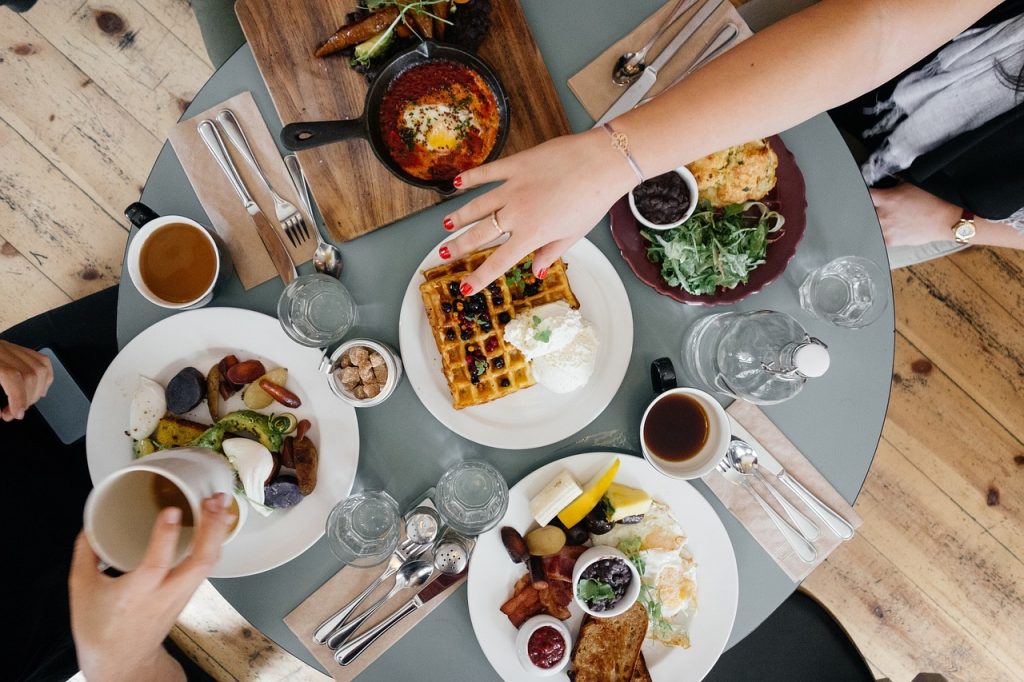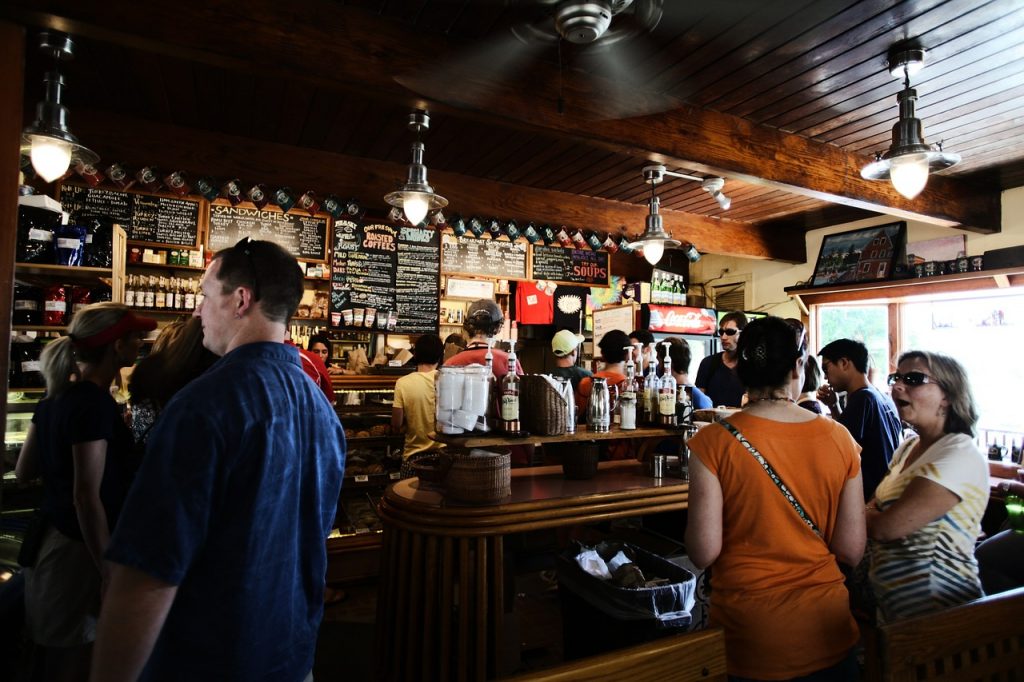5 Distinct Types of Food Establishments in Russia Posted by Maria on Jan 17, 2017 in Culture, language, when in Russia
I’ve noticed in the Anglo-American world, the word “restaurant” has been used to describe many kinds of establishments, from upscale eateries to fast-food joints. I would like to concentrate on the connotations of different Russian words for describing places serving food and why they are not interchangeable.
Ресторан — Sit-Down Restaurant
Ресторан has traditionally referred to a fairly formal sit-down food service facility. Some hallmarks of a traditional ресторан are:
- столик — a table (note the diminutive suffix -ик)
- официант(ка) — a waiter (waitress)
- заказ – an order; заказывать is to order
- счёт – a check
Recently, big fast food chains have started calling themselves ресторан in public communications, but people still refer to them as забегаловка (more on this word below), закусочная (casual eatery, from “закуска” — appetizer) or ресторан/предприятие быстрого питания (fast food restaurant).
Основна́я часть поваро́в в Росси́и тру́дится отню́дь не на ку́хнях фешене́бельных рестора́нов, а в заводски́х и шко́льных столо́вых и́ли, в лу́чшем слу́чае, кейтеринговых компа́ниях.
(Most chefs in Russia work not in the kitchens of upscale restaurants but in factory or school cafeteria or, at best, for catering companies.)
[Такая маленькая зарплата // «Знание-сила», 2013]
Кафе — Café
Кафе is a less formal setting and usually has a more limited menu of snacks/light meals. A business where you may pick up your order at the cash register and where the selection is limited to sandwiches/desserts is likely to be called кафе in Russian, even though some Anglophone countries may call it a “restaurant.”
Кафе does not necessarily mean “coffee house” and may or may not serve coffee. Летнее кафе may refer to a standalone outdoor eatery or summer outdoor seating for an existing restaurant. A related word is кафетерий, which was more popular in the Soviet times and is now falling out of use.
Они́ встре́тились в демократи́чном сетево́м кафе́ ― она́ специа́льно там назна́чила встре́чу, что́бы всё прошло́ легко́ и, так сказа́ть, ни к чему́ не обя́зывало.
(They met in a laid-back chain restaurant — she had arranged to meet there on purpose so that the meeting would be casual and with no strings attached.)
[Маша Трауб. Не вся la vie (2008)]
Столовая — Dining Hall
A place where you go to eat at your place of work, school, or medical facility is called столовая (“cafeteria,” “canteen”), although it may also be a standalone self-service restaurant with stereotypically “Soviet food.” Столовая is often the place where you go on your lunch break.
Normally, столовая may have a different menu each day and will offer all three courses — первое (soup), второе (main course), and третье (dessert). The customers carry the dishes or tray (поднос) to the table and the return them after finishing the meal.
Мы приходи́ли в столо́вую в час, когда́ обе́дали чино́вники и продавцы́ центра́льных магази́нов.
(We would come to the cafeteria at a time when public servants and central store clerks were having their lunch.)
[Михаил Петров. Поэт забвения // «Сибирские огни», 2012]
Буфет — Cafeteria
Буфет is similar to столовая, but it may have more reheated, ready-to-eat items and desserts. Буфет may be located inside a different facility, like a school or theater. Note that this is a “false friend” with “buffet” — an arrangement where you can pick your own food from several options is called “шведский стол” in Russian.
В буфе́те продава́ли ко́фе, бу́лочки и шокола́дки.
(The food stand sold coffee, pastries, and chocolate bars.)
[Алексей Моторов. Преступление доктора Паровозова (2013)]
Забегаловка — Hole-in-the-Wall
First of all, let me note that забегаловка is a colloquial word with ironic to negative connotations, and no business would refer to itself as such. Забегаловка is a quick-stop, hole-in-the-wall, fast food restaurant (not necessarily of the big franchise kind). This word comes from бегать — to run.
A more neutral way of referring to your own fast food restaurant would be закусочная.
Есть рестора́ны, кафе́, столо́вые и про́сто забега́ловки с прекра́сными меню́.
(There are full-service restaurants, cafes, cafeterias, and even holes-in-the-wall with wonderful menus.)
[Александр Дорофеев. Эле-Фантик // «Мурзилка», 2003]

Build vocabulary, practice pronunciation, and more with Transparent Language Online. Available anytime, anywhere, on any device.






Comments:
Richard:
An interesting post, Maria! Is there a Russian phrase to refer to the ubiquitous shopping mall food courts with their usual array of закусочные или забегаловки?
Maria:
@Richard Yes! Ресторанный дворик.
samonen:
@Maria Maria, a ресторанный дворик (very proper Russian) is nowadays called—surprise!—a фудкорт. At least in Pskov there is an aquapark with a shopping center where there is a фудкорт. This prompted me to ponder whether the policy of obliging foreign brands and businesses put thei their signs etc. in Russia in Cyrillic script was a good idea or not. It seems it only makes people more susceptible to accept the onslaught of English (or other foreign) words into Russian usage that older people simply don’t understand and find odd to say the least while the younger generation don’t give them another thought. I’m not saying this development is altogether bad, but it does put the concept of “standard language” in a whole new light.
samonen:
A very good and useful post! Personally, I’ve been more than perplexed by the word “буфет”. Once I heard that “there were bananas and Marlboro cigarettes available at the “буфет” of the Estonian Communist Party Central Committee building”. Wow! This sounded too ridiculous for words to me: the leading local comrades enjoying the fruits of capitalist Big Tobacco while mere mortals were puffing away at their Belomorkanals. Not only Western cigs but at a buffet and for commies?! Jeez…
Now I know better but the thing with the Marlboros is still pretty tragicomic and telling.
Maria:
@samonen Thank you, Samonen! Буфет definitely carries the connotations of the Soviet era, so businesses nowadays try to brand themselves as something else, unless they are going for the Soviet esthetic.
Maria:
@samonen That’s a good point. I think I might have seen фудкорт written, but I haven’t heard people actually saying that. Things change rapidly, though, so perhaps it’s becoming more acceptable. Wikipedia lists both expressions: https://ru.wikipedia.org/wiki/%D0%A0%D0%B5%D1%81%D1%82%D0%BE%D1%80%D0%B0%D0%BD%D0%BD%D1%8B%D0%B9_%D0%B4%D0%B2%D0%BE%D1%80%D0%B8%D0%BA.